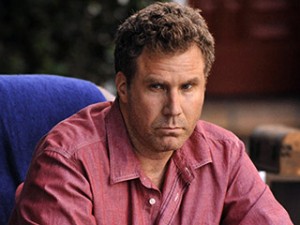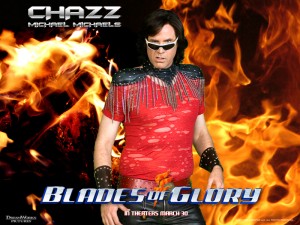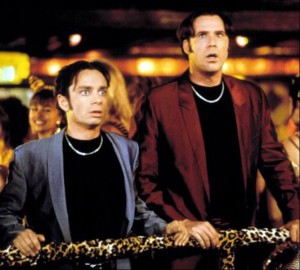
This is my serious face.
I recently watched Everything Must Go, an un-winking, un-laughing psychological drama starring future comedy Cooperstowner Will Ferrell. In the movie, Will plays an alcoholic who loses his wife and his home and is forced to live on his lawn holding a perpetual garage sale until he clears out the baggage in his life and frees himself to move forward. It also features, surprisingly, Glenn Howerton (Dennis from It’s Always Sunny In Philadelphia) in a role that isn’t very funny, and, less surprisingly, Laura Dern in a role where she is not chased by dinosaurs.
Despite its singular lack of farce or whimsy, Everything Must Go is not unique among Will Ferrell movies in espousing serious messages about life, love, family, aspiration, and a range of other topics. Most of Will’s movies tackle intenstely serious intellectual, scientific, philosophical and social questions across an extraordinarily broad span of human knowledge. Here are seven of them.
7. Political progress and individual consciousness depend on social existence. (Zoolander)
In this stirring take on identity and aspiration in the fashion industry, eccentric executive and designer Jacobim Mugatu brainwashes a fading fashion model, grieving the loss of friends in a tragic gasoline fight, to assassinate the prime minister of Malaysia. The goal of the assassination is to head off left-wing reforms in Malaysian labor practices that would raise the cost of manufacturing within Mugatu’s multinational capitalist enterprise.
Mugatu’s plan is ultimately unsuccessful. With the strength drawn from solidarity with former rival Hansel, love interest Matilda, David Bowie, Billy Zane, and fashionlotariat, Derek throws off Mugatu’s conditioning and saves the prime minister. It is assumed that social progress in Malaysia continues.
(CORRECTION: In the original draft of this rigorous intellectual inquiry into the ouvre of half of the Spartan cheerleaders, I made a gross quotation misattribution here, which was entirely my fault for lazily using Wikipedia as a source – both in the sense that the choice was lazy, and that I did so lazily.
My thanks go out to intrepid Overthinking It reader Ezra, who pointed out that the following quotation, which I attributed to French Marxist philospher Louis Athusser, is actually two quotations from two different souces. (Incidentally, Louis Athusser still killed his wife, and I still don’t want that to reflect poorly on Will Ferrell):
It is not men’s consciousness that determines their existence, but, on the contrary, their social existence that determines their consciousness.”
– Karl Marx
Only when the core of existence stands revealed as a social process can existence be seen as the product, albeit the hitherto unconscious product, of human activity.”
– Georg Lukac
The real kicker is I am not fact-checking Ezra at all, so if this is wrong, it is a totally awesome meta-burn. And noiw we carry on with our regularly scheduled article. -PF)

No, this is my serious face.
As important and influential as the prime minister is, he is still of course only one person, and the social progress in Malaysia is part of a broader social and historical struggle of the proletariat against the abuses of international capitalism. Symmetrically, as effective an assassin as Zoolander might be, he is still only one person, subject to the tidal influences of historical dialectic.
So Mugatu’s absurdity is that he seeks to shape the march of history by manipulating individual people as if he had a consciousness that preceded social existence. How crazy can a guy get? Also his hair. And his sweater.
6. Execution is a separate and more difficult business discipline from strategic planning. (A Night at the Roxbury & Semi-Pro)
Will Ferrell is a looming, smiley, authoritative figure who looks like he drinks reasonable beer and played sports in high school (which by all accounts he did), so it is not surprising he is cast from time to time as a manager. Two of his movies in particular drill down into some of the toughest questions in business leadership and entrepreneurship, as the Butabi brothers attempt to open their dream nightclub in A Night at the Roxbury, and the Flint Tropics attempt to survive the merger of the American and National Basketball Associations in Semi-Pro.

This is my foul shot face.
In each case, Will’s character is an imaginative visionary with the panache, open mind, and sense for the unmet demands of the market necessary to develop a product and bring it to market in a way that will excite people and connect with customers. In the age of Steve Jobs, one might see him as an ideal leader — or at least a Barnes & Noble Business Section imitation. But in reality, even Steve Jobs relied on more than his intuition or taste — he drove execution and not only was able to compel his ideas to become reality, but to engage, inform, energize and operationalize Apple to work toward the common goal effectively and efficiently.
As for Will’s leadership vision, in one case, it was a man fighting a bear to the death during a basketball game, in the other, it was a club that looked like a nightclub on the outside, but a street on the inside. In each case, Will runs into structural issues within his business operations that make execution of the idea difficult to achieve. In Semi-Pro, it is the limits of his own talents, which takes him on a humbling journey toward a greater understanding of the importance of effective delegating. In Roxbury, it is the limits of the script and premise that takes him on a humbling journey of an entirely different nature.
It is easy to attribute these failures to foolishness, but, as these instructive movies show us, executing successfully on ideas, even brilliantly visionary ones, is very difficult in a business environment. Take, for example, this excerpt from “The Secrets to Successful Strategy Execution,” by Gary L. Neilson, Karla L. Martin, and Elizabeth Powers in the June 2008 Harvard Business Review (emphasis mine):
A brilliant strategy, blockbuster product, or breakthrough technology can put you on the competitive map, but only solid execution can keep you there. You have to be able to deliver on your intent. Unfortunately, the majority of companies aren’t very good at it, by their own admission. Over the past five years, we have invited many thousands of employees (about 25% of whom came from executive ranks) to complete an online assessment of their organizations’ capabilities, a process that’s generated a database of 125,000 profiles representing more than 1,000 companies, government agencies, and not-for-profits in over 50 countries. Employees at three out of every five companies rated their organization weak at execution — that is, when asked if they agreed with the statement ‘Important strategic and operational decisions are quickly translated into action,’ the majority answered no.”
In Roxbury, Will’s character ends up a partial owner of his dream nightclub, after involuntarily passing operations and strategic execution to a more experienced nightclub owner, who is gracious enough to cut him in as a partial owner due to his intellectual property (and of course his partnership with Senior Executive Headbopper Chris Katan). In Semi Pro, the challenge for Will’s character is more complex — a marketing savant, Jackie Moon decides to delegate coaching responsibilities to actual superior basketball players, which ends up somewhat successful. It tracks the usual path of businesses (and the Flint Tropics in the film are a business) to react to difficulties in execution with restructuring. While a partial solution, the Tropics do eventually end up closing up shop, and Will moves on to a role as an executive in the newly united NBA. Again, from the Harvard Business Review:
Execution is a notorious and perennial challenge. Even at the companies that are best at it—what we call “resilient organizations”—just two-thirds of employees agree that important strategic and operational decisions are quickly translated into action. As long as companies continue to attack their execution problems primarily or solely with structural or motivational initiatives, they will continue to fail.”
Will’s movies about starting or sustaining a business tend toward a brutal honesty on the likelihood of their success — far from the masters of the universe that are often shown in shady board rooms in mighty towers, most business leaders are stymied every day by complex operational issues that seem pedestrian to the rest of us. The truth in the comedy is in the vulnerability and limits of the manager.
5. Primal physiological gestures influence mind-body states. (Elf)
I just like to smile, smiling’s my favorite”
– Buddy the Elf
Elf is a movie about modern psychodynamics — specifically, the tensions created in adult life by adaptations that took place in childhood and are deeply rooted in the subconscious mind — or in behavior patterns, gestures, or other similarly functioning physiological elements. The key question of Elf from a psychodynamic standpoint is which of these adaptations are maladaptive, and how they lead to pernicious tensions and difficulties.
Due to his upbringing by elves at the North Pole, Buddy has a number of primal physiological gestures that are so deeply rooted in his behavior that they have a profound effect on his reactions to most of the things he encounters in his life. These behavioral elements are cyclical and self-reinforcing — Buddy’s developmentally acquired fondness for smiling causes him to be more likely to smile in response to things, which in turn affects his attitude and disposition toward things, making it generally more buoyant and happy, which creates a potential tension or discomfort in confronting things for which smiling is not necessarily an appropriate response.
If Buddy were to go through psychodynamic psychotherapy, he and his therapist may work on digging down to the root of why he likes to smile, or why he compulsively cuts paper snowflakes when left alone, or why he considers syrup a food group. They might discuss and track the ways these attitudes affect how he acts on a daily basis, and vice versa.
Of course, Elf throws a twist into this question by taking a Foucault-inspired opposition to the discursive structures of mental illness, pointing out that Buddy’s psychodynamic adaptations may not be maladaptive, but may be marginalized because of a social power dynamic. Everyone else around him might be experiencing more tension and discomfort in their adult lives because they had childhood experiences that were not like Buddy’s. And in that case, James Caan would be undergoing psychodynamic psychotherapy to determine why he acts mean-spiritedly toward a long-lost son or why he does not have the professional confidence to take responsibility for the children’s book that will save his job himself.
Regardless, Elf espouses a very clear relationship between habitual actions and mental states, heavily influenced by preexisting behavior patterns. Or, more elegantly put:
The best way to spread Christmas Cheer, is singing loud for all to hear.”
Elf is also a movie about Christmas.
4. Discursive gender binaries are nonbiological. (Blades of Glory)

This is as serious as it gets.
In the Palm d’or-winning Hitchcockian skating thriller Blades of Glory, Chazz Michael Michaels and Jimmy MacElroy comprise a gender binary, with Chazz as the active, masculine, yang skater and Jimmy as the passive, feminine, yin skater. Gender binary is one of many potential gender systems, where gender is articulated by a splitting, a division of signifiers across a discourse in time (everything from body parts to toys to songs to ways of walking down the street), on either side of a dividing line between the masculine and the feminine.
It is a rather popular opinion that binary gender proceeds at the very least from a reference to the biological phenomena that bring about what is termed primary and secondary sex characteristics, but Blades of Glory shatters this notion by deeply ingraining the gender binary with a splitting that excludes biological sex, but is still thoroughly clear unambiguous in its assignments of traits and roles. For example:
http://www.youtube.com/watch?v=uDJz9LRbCl8
Consider the moves the two skaters make, their costumes, their faces, their points of focus, their dispositions — in every aspect of the performance, Chazz exhibits “masculine-ness,” and Jimmy shows “feminine-ness,” despite the fact that Chazz doesn’t really have all that masculine a body, and Jimmy isn’t really like a woman or even somewhere in third gendersville with his sexual identity — he’s totally straight, yet, as required by the discursive structures of the story, thoroughly feminine.
This binary is of course not surprising, because Blades of Glory is an homage and parody of The Cutting Edge, a movie that adhered to and heightened gender binary in every film of celluloid and every spin of every DVD in front of every Snuggie and every pint of Ben & Jerry’s. The title The Cutting Edge can be read as referring to the structure of the gender binary itself — with the vehicle of the metaphor being skating, and its tenor both the splitting action of the gender binary construction itself, the gender binary’s discursive shape, and the attendant hostility that does not necessarily emerge from such system, but sure seems to.
Take a look at The Cutting Edge; the places where Blades of Glory borrows are obvious.
The 2010 TV movie sequel to The Cutting Edge is even subtitled Fire and Ice — and even has the kindness to add a racial binary to a gender binary, with a white dude and a woman of color “overcoming” their differences to achieve the incredibly challenging task of heterosexual union.
Unfortunately, Blades of Glory’s gender binary does have a sinister side, found in the movie’s climactic, ultimate skating move, the forbidden North Korean Iron Lotus. Observe the Korean version:
And the (spoilers) Chazz and Jimi version:
Note that in the original Iron Lotus, it is always the woman who gets her head chopped off, yet in the Chazz and Jimi version, because it is men doing it, he just gets a shave, straight out of Gilette commercial.
3. In explosion, the shock front precedes the contact front. (The Other Guys)
The Will Ferrell / Mark Wahlberg stirring cop drama and instructional video The Other Guys contains one of the finest and most daring scientific inclusions in the history of film:
In many movies, the heroes walk harmlessly away from an explosion where a highly heated gas, the product usually of rapid combustion, rises and smokes harmlessly behind them.
Of course, in real explosions, the heated gas propelled by the explosion rapidly expands, displacing the air around it and creating a shock wave that would almost certainly send most action heroes to the hospital. By the time the “contact front,” (the front end of the wave of heated gas) reaches our hero to roast him, the shock front has most likely already caused critical damage, or at least a lot of moaning and rolling around on the ground.
Here is an illustration from the stirring “Time-Resolved Shadowgraphs of Material Ejection in Intense Femtosecond Laser Ablation of Aluminum,” by Nan Zhang, Xiaonong Zhu, Jianjun Yang, Xiaolei Wang and Mingwei Wang, of the Institute of Modern Optics, Nankai University, Key Laboratory of Opto-electronic Information Science and Technology, supported by the Education Ministry of China and published in the October 19, 2007 issue of 中国科技论文在线:
Three shadowgraphs at larger time delays in Figure 3 show the developments of a shock wave and a contact front after the event of a phase explosion. The shock wave is formed once the energetic ablated material ejects into the ambient air and compresses the air at its front.”

The exterior wave in the shadowgraph is the shock wave. The interior cloudy mess is the contact wave.
This is why the movie Desperado is unrealistic. There is no other reason
2. The transcendental signifier does not describe itself. (Talladega Nights: The Ballad of Ricky Bobby)
In setting down the rules of everybody’s favorite literary and social theoretical movement, deconstruction, Jacques Derrida called the preceding structuralism into question by claiming it relied on a “transcendental signifier,” an ultimate sign from which truth, authority, or the other major characteristics of discourse are derived. One of the characteristics of a transcendental signifier is that is does describe itself — it aspires to a signified (a thing pointed to) that is outside language.
Derrida offers God (to the religious), Man (to the humanist), Language (to the graduate student), and other ultimate authorities as transcendental signifiers, set in opposition to the speech used to refer to them, but not themselves inscribed in speech. See, Derrida did not so much ascribe to the difference between the signifier and the signified.
Talladega Nights, as daring a work of contemporary philosophy of language as Will Ferrell has starred in, demonstrated how a transcendental signifier that reaches for a signified outside of language can function within the discourse of a typical American family.
In these clips, the transcendental signifier is Jesus, from whom the protagonists draw the meaning of their nightly meal rituals and a great deal of the rest of their discourse. The movie on more than one occasion shows a variety of signifiers associated with Jesus in an incoherent manner that still manages to function, and seems comfortable and intuitive, shattering Derrida’s legacy and bringing about a new era in sociolinguistic understanding:
1. Active bacterial spores survive conventional pasteurization, and filling equipment can recontaminate pasteurized milk products. (Anchorman)
Will Ferrell has made many contributions to human understanding in the humanities and the sciences, but perhaps his greatest contribution was to agribusiness and public health, when he made Anchorman, his legendary comedy about pasteurization and dairy good spoilage:
http://www.youtube.com/watch?v=APAySMepRm8
As everyone knows, milk spoilage is a result of microbial activity — the production of lactic acid (and not the cool way that involves running marathons and banging out widowmaker squats), proteolysis (the breakdown of proteins by cellular enzymes), lipolysis (the same with fats), and sweet (and not the cool way your freshman year roommate says it when you suggest Ultimate Frisbee) curdling.
However, doesn’t pasteurization, which any cartoned milk in San Diego is going to have undergone, kill the microbes in milk? Wouldn’t that mean that spoilage of milk in the home generally comes from the introduction of microbes after the milk has been opened? Yes, high temperatures can stimulate the growth of the microbes that cause milk spoilage, but those microbes don’t just spontaneously generate in the milk after pasteurization!
Not so fast, says Kenneth Todar, PhD. in his Online Encyclopedia of Microbiology, in the chapter “Control of Microbial Growth”:
Pasteurization is the use of mild heat to reduce the number of microorganisms in a product or food. In the case of pasteurization of milk, the time and temperature depend on killing potential pathogens that are transmitted in milk, i.e., staphylococci, streptococci, Brucella abortus and Mycobacterium tuberculosis. But pasteurization kills many spoilage organisms, as well, and therefore increases the shelf life of milk especially at refrigeration temperatures (2°C).
Milk is usually pasteurized by heating, typically at 63°C for 30 minutes (batch method) or at 71°C for 15 seconds (flash method), to kill bacteria and extend the milk’s usable life. The process kills pathogens but leaves relatively benign microorganisms that can sour improperly stored milk.”
Furthermore, heat activates otherwise dormant bacterial spores, such that even when pasteurization has killed the microbe proper, exposure to the hot San Diego sun and thick Ron Burgundy beard can accelerate bacterial growth anew and spoil the milk quickly.
But what about that long-life milk stuff in boxes that was so popular in the late 90s and led to the as-yet to date largest bankruptcy in the history of Europe in 2003? Well, Parmalat long-life milk was ultrapasteurized, and the milk Ron Burgundy famously drank in Anchorman was not. Again, Dr. Todar drops the science:
During the process of ultrapasteurization, also known as ultra high-temperature (UHT) pasteurization, milk is heated to temperatures of 140 °C. In the direct method, the milk is brought into contact with steam at 140°C for one or two seconds. A thin film of milk falls through a chamber of high-pressure steam, heating the milk instantaneously. The milk is flash cooled by application of a slight vacuum, which serves the dual purpose of removing excess water in the milk from condensing steam. In the indirect method of ultrapasteurization, milk is heated in a plate heat exchanger. It takes several seconds for the temperature of the milk to reach 140°C, and it is during this time that the milk is scalded, invariably leading to a burned taste. If ultrapasteurization is coupled with aseptic packaging, the result is a long shelf life and a product that does not need refrigeration.”
So perhaps it was not milk itself that was the bad choice, but merely choosing pasteurized milk over less tasty but more heat-resistant ultrapasteurized milk.
Still, I am somewhat skeptical — with the fiscal difficulties currently in play in Europe, it may not be wise to get too close to Parmalat again — and Will Ferrell has not yet released the movie that solves the European debt crisis.
I heard it’s in development, though, and scheduled to come out in mid 2013.
As for solving America’s economic problems, Will Ferrell finished those off in December, with his spots for Old Milwaukee:


You’ve misattributed that quote, “It’s not men’s consciousness,” etc. The 1st sentence is from Marx himself, the 2nd from Georg Lukacs.
My apologies – I’ll make a correction later today, when I get to a proper computer. Hope you enjoyed the article!
Computer found, and correction made! Thanks, Ezra!
Excellent work, Mr. Fenzel. Promotions all around.
If the list could be expanded, I, for one, would love to draw a lesson from Mr. Ferrell’s most complex character to date, Frank “The Tank” Ricard (Old School). We all, to some extent, mourn the loss of our youth, moving appropriately through the Kubler-Ross progression to acceptance. Frank, however, suffers from crippling gerascophonia, or fear of aging, which keeps him trapped in the first “denial” stage of the mourning process, even in the face of overwhelming evidence of adulthood. This illness propels his reckless forays into youthful behavior, or, more appropriately, his comically outdated idea of youthful behavior.
His disability is perfectly obvious to everyone around him, and yet he is still left to suffer in isolation. His wife, Lara, is a portrait of cruel indifference to Frank’s struggle. His good friends go beyond mere indifference and actually encourage his sickness. The last thing they seem to want is for Frank to get the help he needs.
Though Frank is a minor character in the movie, I think the clear-eyed, gritty portrayal offered by Ferrell helps put Old School in the pantheon of great mental disability movies, along with Cuckoo’s Nest, Girl Interrupted, and When a Man Loves a Woman.
I heard a rumor that Ferrell’s treatment of the character was so poignant that co-star Sara Tanaka vowed never to act again, so great was the difference between her competent acting and his passionate portrayal.